10 Healthiest Plant-Based Protein Bars—and 3 to Avoid
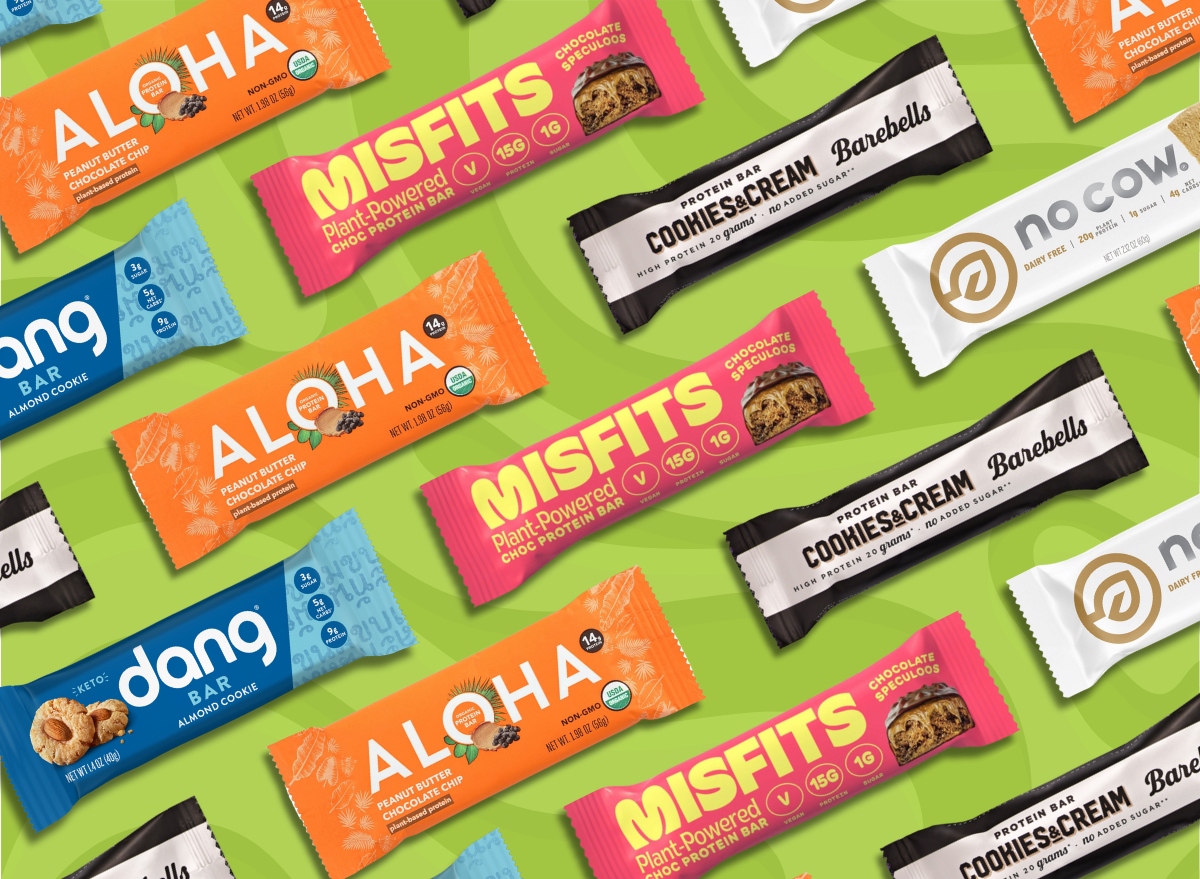
Protein is essential for maintaining and repairing our bodies, from our muscles to our bones. It also plays a key role in slowing down digestion and promoting lasting feelings of fullness after meals. The building blocks of protein, amino acids, are the foundation of hormones and enzymes that control virtually all of your bodily functions.
For those following a plant-based lifestyle, the pursuit of reaching your optimal protein intake is a daily endeavor. While people may assume that consuming enough protein on a plant-based diet is unattainable, you can certainly get the amount you need by eating a well-balanced diet rich in plant proteins like nuts, seeds, legumes, and soy foods. That being said, having plant-based protein bars on hand can be an easy way to help ensure that you meet your daily protein requirements.
How much protein do you need?
To maintain lean body mass and ensure optimal health, experts recommend consuming well above the minimum daily protein intake. For sedentary individuals, the baseline starts at 0.8 grams per kilogram of body weight or 0.36 grams per pound. However, for those aiming to build muscle mass, a higher intake is advisable. Moderately active individuals should target around 1.3 grams of protein per kilogram of body weight.
Active individuals, particularly athletes, have even greater protein requirements. A review published in the Journal of the International Society of Sports Nutrition found that the ideal intake ranges from 1.4 to 2.0 grams per kilogram of body weight or 0.6 to 1 gram per pound. For athletes focused on fat loss, recommendations increase to 1.6 to 2.4 grams per kilogram of body weight or 0.7 to 1.1 grams per pound, according to a study published in the International Journal of Sport Nutrition and Exercise Metabolism.
Plant-based protein bars can serve as a satisfying snack between meals or aid in post-workout recovery. To maximize the absorption and utilization of amino acids, experts recommend distributing protein intake across three to four eating occasions throughout the day.
How to choose the healthiest plant-based protein bars:
Keep these guidelines in mind when choosing a healthier plant-based protein bar.
- Calories: Choose plant-based protein bars with no more than 250 calories.
- Protein: A plant-based protein bar should have at least 10 grams of protein. Some of the popular sources of plant-based protein include pea, soy, nuts, and seeds.
- Added Sugar: Look for bars that have up to 8 grams (2 teaspoons) of added sugar. Any more than that, and you’re likely going to exceed your daily added sugar limits.
With hundreds of protein bars available at supermarkets, natural foods stores, and online, it can be confusing to determine which are the healthiest versus those that are nothing more than candy bars in disguise. Here are 10 best plant-based protein bars and three to avoid.
10 Best Plant-Based Protein Bars
Best: ALOHA Organic Peanut Butter Chocolate Chip
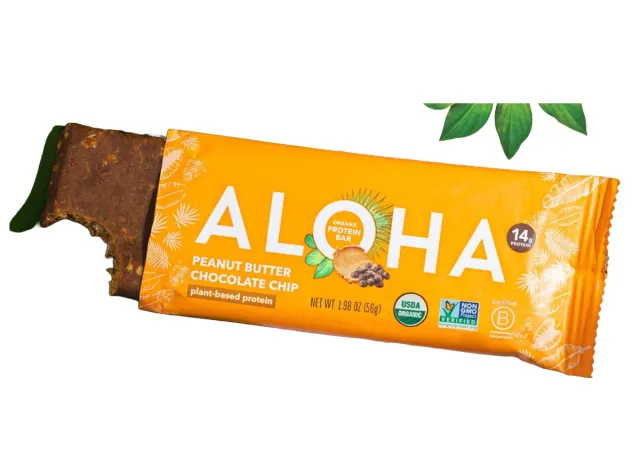
ALOHA bars are made with natural ingredients, with the main ingredient being peanuts and pumpkin seeds. The protein content is high as is fiber, and sugar counts are low. The bars are sweetened with monk fruit to help minimize cane sugar. As a bonus, the bars are USDA-certified organic.
Best: R.E.D.D. Salted Caramel Plant-Based Protein Bar
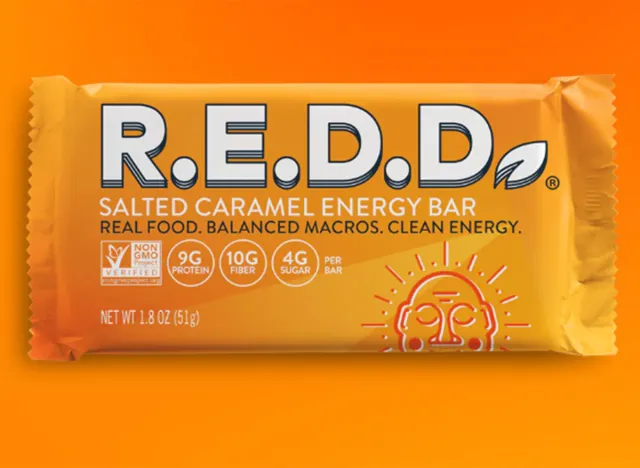
This bar is moderate in calories and high in fiber, thanks to tapioca fiber being the first ingredient. The protein comes primarily from peanut butter, pea protein, and hemp protein. Plus, the bars only have 1 teaspoon (4 grams) of added sugar. The bars also contain turmeric, acai, and added probiotics for additional health benefits.
Dang Almond Cookie Bar
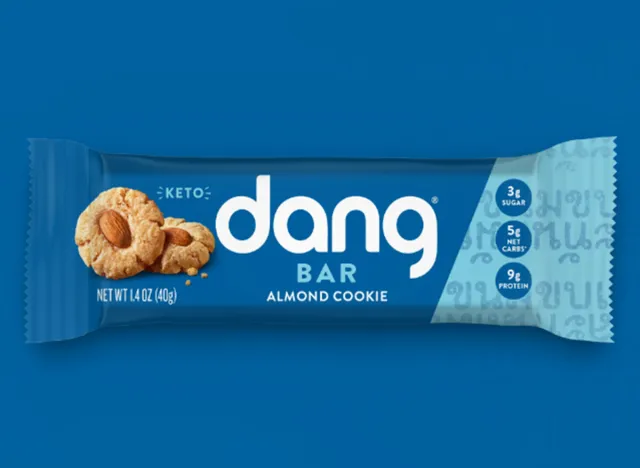
These bars make the best-bet list due to the natural ingredients. Almonds are the first ingredient and the fiber comes from chicory root fiber. Other sources of protein in this bar come from pea protein, sunflower, and chia seeds. The bars are sweetened with stevia and have no added sugar.
Best: Bob’s Red Mill Peanut Butter Honey & Oats Bar
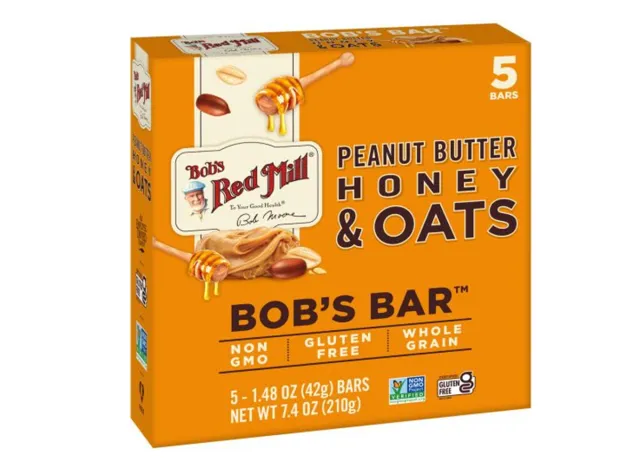
This bar isn’t as high in protein as most protein bars, but because it’s made with only six natural ingredients, it’s one of our top picks. Bob’s Red Mill is well-known for their grains, cereals, and baking mixes. The main ingredients include peanuts, whole-grain oats, and tapioca syrup. The sugar count is also within reason with 2 teaspoons (8 grams).
Best: No Cow S’Mores Protein Bar
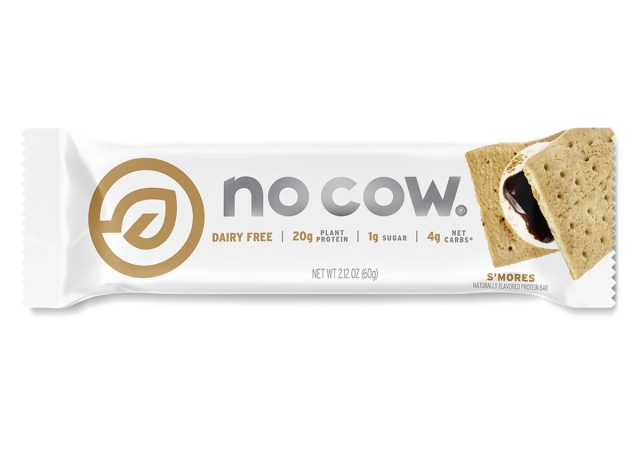
These bars have one of the best nutritionals with 15 grams of fiber, more than half the fiber you need in a day. With 20 grams of protein, these bars have amongThe bars also have no added sugar. The protein comes from peas, rice protein, and almonds. Monk fruit, stevia, and erythritol are the sweeteners used to create the perfect balance of sweetness in this bar.
Best: Misfits Plant-Powered Chocolate Protein Bar –Cookie Butter
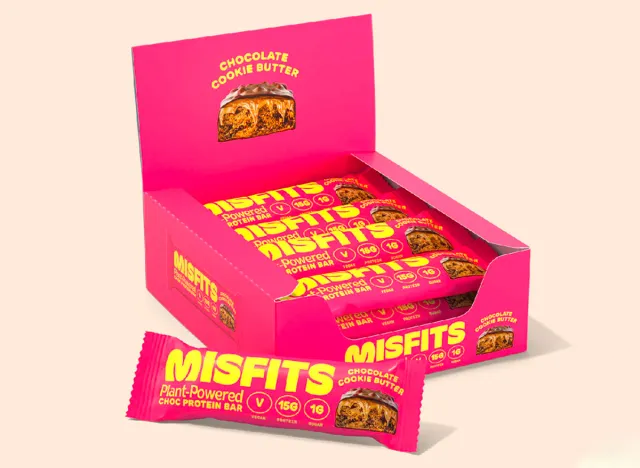
This protein bar is often heralded as the best-tasting plant-based protein bars. And I agree. The bars may taste more candy-like, but nutritionally they can be good for your health. They are high in fiber and have no added sugar. The 20 grams of protein comes primarily from pea and soy protein and peanuts.
Best: Barebells Cookies & Cream
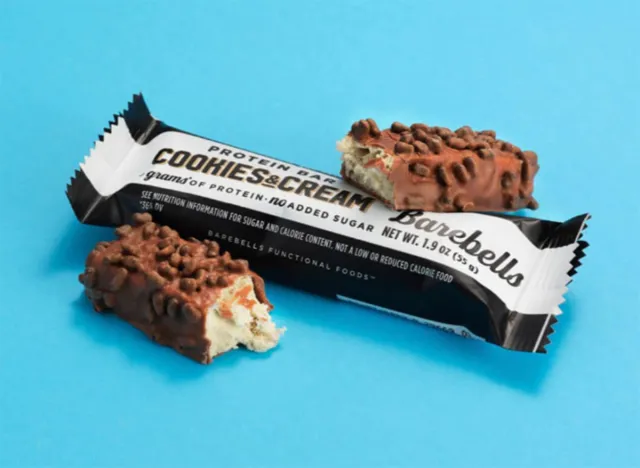
Barebells protein bars are tasty, and while they are not vegan (they contain dairy protein), they do pack in 20 grams of high-quality protein without any added sugar. The bars are sweetened with sucralose to create a decadent protein bar that won’t blow your daily calorie or added sugar budget.
Best: good! Snacks Choc. P.B. Protein Bar
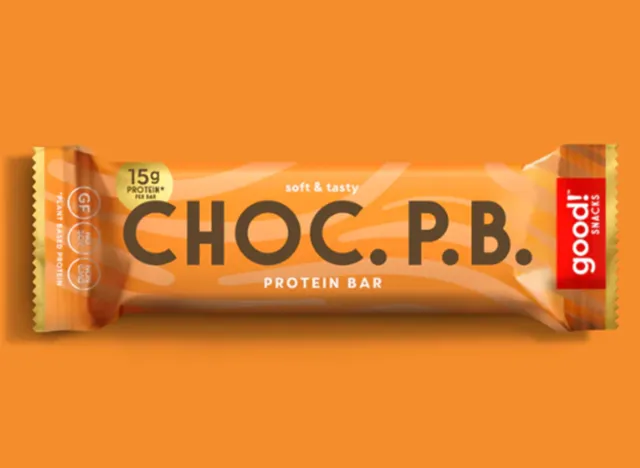
Chocolate and peanut butter are always a crowd-pleaser, and these bars are no different. Nutritionally, they meet our criteria for the healthiest protein bars while tasting like a more decadent treat. The protein in the bars comes from fava beans and rice protein. The bars are sweetened with cane sugar but still keep added sugar to 2 teaspoons.
Best: good! Snacks Keto Choc.Fudge
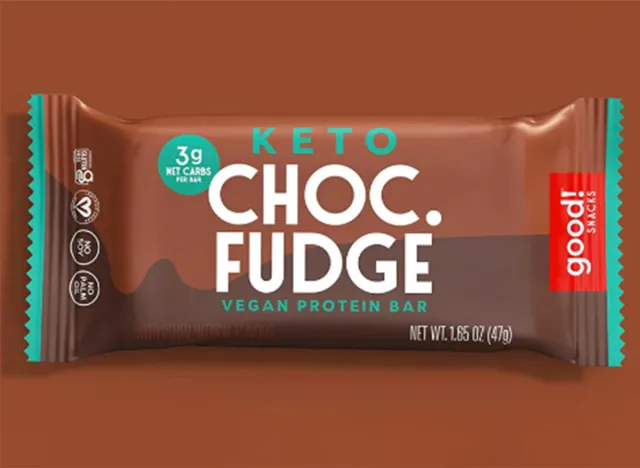
good! Snacks also offers a keto-friendly line of protein bars that have fewer calories, carbs, and no added sugars. The protein in the bars comes from almond butter and pea protein and the bar is sweetened with allulose, a great-tasting zero-calorie sweetener. The bars have 3 grams of net carbs for those living a low-carb lifestyle.
Best: MOSH Lemon White Chocolate Crunch
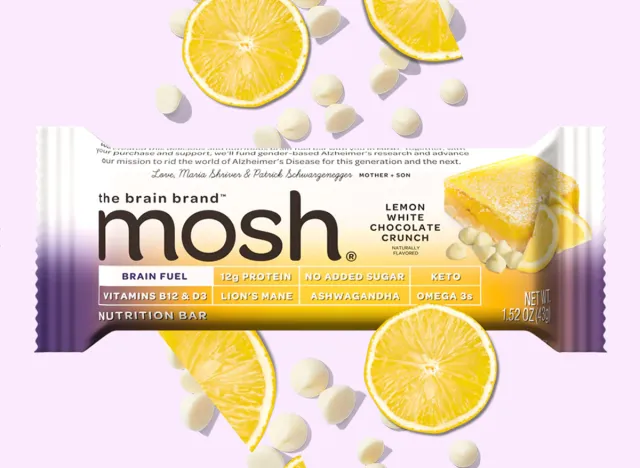
These bars are plant-based, but they are not vegan as the protein comes from whey protein and they contain bovine collagen. They taste great and the added sugar is kept low because they’re sweetened with allulose and stevia, zero-calorie sweeteners. With just 2 grams of net carbs, these bars are great for those who limit carbs. Some additional ingredients in these bars include vitamin D3, ashwagandha, and vitamin B12.
3 Worst Plant-Based Protein Bars
Worst: Chocolate Mint Perfect Bar
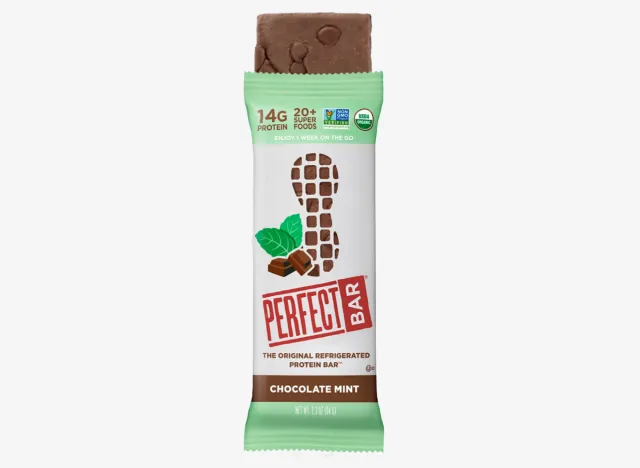
There are many reasons why these bars are one of our worst choices. First, they are high in calories, high in saturated fat, and have 3 teaspoons of added sugar. The protein in these bars comes from peanut butter, nonfat dry milk, whole egg, and rice protein. The ingredients are natural, but just too high in calories, fat, and sugar for a plant-based protein bar.
Worst: GoMacro Peanut Butter Chocolate Chip Protein Pleasure Macrobar
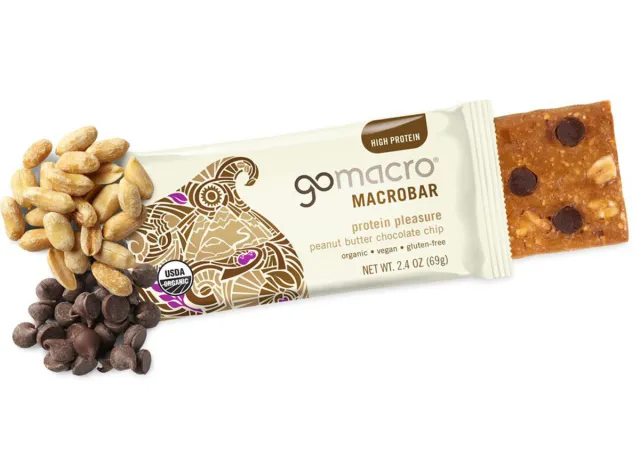
This bar has more added sugar than it does protein, making it one of the worst plant-based protein bars bars to avoid. The first ingredient is brown rice syrup, which is a cue that the bar has too much sugar. In addition to high sugar counts, this bar is low in fiber, with just 2 grams per bar.
Worst: ProBar Cookie Dough Protein Bar
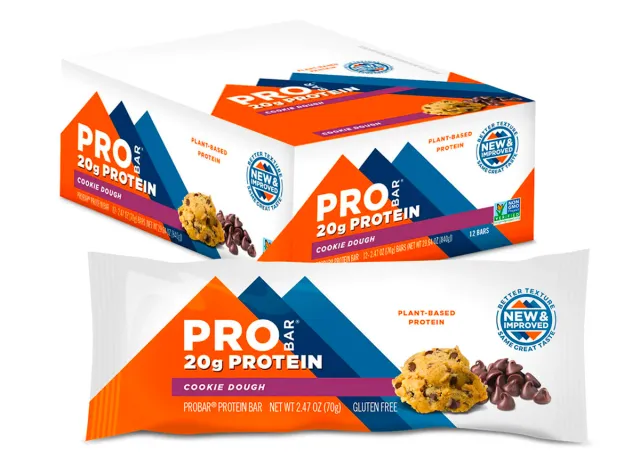
This bar is a good source of protein, but it has more added sugars than most protein bars on our list at 12 grams. The second and fourth ingredients are sugars, which contribute to the three teaspoons of the sweet stuff per bar. In addition, the sodium and saturated fat levels are higher than most, with one serving providing about 25% of the daily recommended limit of saturated fat.
- Source: Wu G. (2016). Dietary protein intake and human health. Food & function, 7(3), 1251–1265. https://doi.org/10.1039/c5fo01530h
- Source: Wu G. (2016). Dietary protein intake and human health. Food & function, 7(3), 1251–1265. https://doi.org/10.1039/c5fo01530h
- Source: Jäger, R., Kerksick, C. M., Campbell, B. I., Cribb, P. J., Wells, S. D., Skwiat, T. M., Purpura, M., Ziegenfuss, T. N., Ferrando, A. A., Arent, S. M., Smith-Ryan, A. E., Stout, J. R., Arciero, P. J., Ormsbee, M. J., Taylor, L. W., Wilborn, C. D., Kalman, D. S., Kreider, R. B., Willoughby, D. S., Hoffman, J. R., … Antonio, J. (2017). International Society of Sports Nutrition Position Stand: protein and exercise. Journal of the International Society of Sports Nutrition, 14, 20. https://doi.org/10.1186/s12970-017-0177-8
- Source: Hector, A. J., & Phillips, S. M. (2018). Protein Recommendations for Weight Loss in Elite Athletes: A Focus on Body Composition and Performance. International journal of sport nutrition and exercise metabolism, 28(2), 170–177. https://doi.org/10.1123/ijsnem.2017-0273









